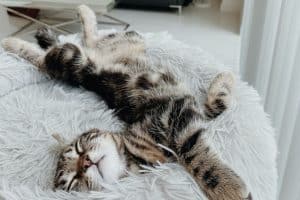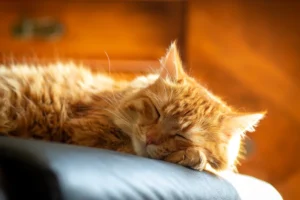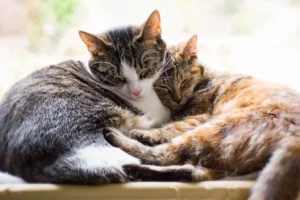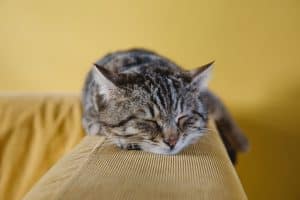Cats are notorious for disrupting our sleep at night, but have you ever stopped to wonder why they seem to be particularly active during those late hours? In this blog post, we will explore the reasons behind why cats are bad at night.
Natural Nocturnal Instincts
If you’ve ever wondered why your cat seems to transform into a furry little tornado at night, the answer lies in their natural nocturnal instincts. Cats are crepuscular animals, meaning they are most active during the dusk and dawn hours. This behavior stems from their wild ancestors who primarily hunted during these times to avoid competition from larger predators.
During the night, your cat’s senses are heightened, and their night vision allows them to see in low light conditions. This made hunting easier for their ancestors and has been ingrained in their DNA over generations. So, when your kitty is racing around the house at 3 am, it’s their inner wildcat coming out to play.
Huntress Mentality
To understand why cats can seem like little ninjas of the night, we need to delve into their huntress mentality. Cats are natural-born hunters, with a sharp focus and a killer instinct that drives them to stalk, pounce, and capture prey. This hunting behavior is not just for survival but also for play and mental stimulation.
When your cat is darting around the house in the wee hours, they are channeling their inner predator, honing their hunting skills by chasing after toy mice or shadows. This behavior satisfies their instinctual drive to hunt, even if it’s just a feather wand in your living room.
Additional Insight:
- Providing interactive toys and play sessions during the day can help satisfy your cat’s hunting instincts, reducing their nighttime activity. Remember, a tired cat is a happy cat!
Lack of Stimulation During the Day
Do you ever wonder why your cat seems to turn into a nocturnal creature once the sun goes down? One common reason for cats being more active at night is a lack of mental and physical stimulation during the day. Cats are natural hunters, and without ample opportunities to engage in play and exercise during daylight hours, they may become restless and seek out activities during the night.
To help curb your cat’s nighttime antics, make sure to provide plenty of interactive toys, scratching posts, and opportunities for play throughout the day. Puzzle feeders or food-dispensing toys can also help keep your feline friend mentally stimulated and engaged. By ensuring your cat has plenty of activities to keep them busy during the day, you may find that they are more inclined to relax and rest at night.
Circadian Rhythm Differences
Have you ever noticed that your cat’s sleep schedule doesn’t quite match up with your own? Cats are crepuscular animals, meaning they are most active during dawn and dusk. Their natural circadian rhythm differs from ours, which can lead to conflicting sleep schedules. While we tend to be most active during the day and sleep at night, cats may be ready to play and explore when we are winding down for the evening.
Understanding your cat’s natural sleep patterns can help you adjust your interactions with them to better align with their needs. Try engaging in interactive play sessions with your cat during the early evening to encourage them to expend energy before bedtime. Additionally, creating a cozy and comfortable sleeping area for your cat can help promote restful sleep during the night.
Remember, providing a stimulating environment during the day and respecting your cat’s unique circadian rhythm can help address nighttime behaviors and promote a peaceful coexistence between you and your feline companion.
Evolutionary Factors
Cats’ nighttime antics can be traced back to their evolutionary roots as skilled nocturnal predators. These frisky felines are naturally wired to be more active when the sun goes down, thanks to their ancestors’ hunting habits. Back in the day, cats would roam and hunt during the night, using their sharp senses and keen eyesight to track their prey. This instinctual behavior has carried over into domestic cats, making them more prone to playful behavior and nighttime prowling.
Another interesting evolutionary trait is cats’ exceptional ability to see in low light conditions. Their eyes contain a special reflective layer called the tapetum lucidum, which enhances their vision in the dark. This unique feature gives cats a distinct advantage when it comes to hunting at night, but it also means they are naturally more active during the wee hours.
So, the next time your kitty is racing around the house at 2 a.m., remember that it’s just following its primal instincts as a nighttime predator.
Environmental Triggers
While evolutionary factors play a significant role in cats’ nighttime behavior, there are also environmental triggers that can exacerbate their nighttime antics. One common trigger is a lack of mental and physical stimulation during the day. If your cat isn’t getting enough playtime or environmental enrichment, it may be more prone to nighttime restlessness and hyperactivity.
Unpredictable noises or movements in the house can also incite nighttime playfulness in cats. Loud noises, such as cars driving by or household appliances running, can trigger a cat’s hunting instincts and prompt them to engage in frenzied play. Additionally, if your cat can see outdoor wildlife through a window, it may become fixated on the potential prey, leading to increased nighttime activity.
To help curb your cat’s nighttime escapades, try incorporating more daytime play sessions, providing interactive toys, and creating a comfortable and secure sleeping environment. By addressing these environmental triggers, you can help your cat feel more at ease and content during the night.
Extra Tip: Consider investing in a cat tree or climbing shelves to provide vertical space for your cat to explore and expend energy, which can help reduce nighttime restlessness.
Solutions for a Better Night’s Sleep
Is your cat keeping you up all night with their antics? Fear not, there are solutions to help both you and your furry friend get a better night’s sleep. Firstly, try to establish a routine with your cat by feeding them at regular times during the day. This can help regulate their energy levels and reduce nighttime hyperactivity. Providing engaging toys or interactive play sessions in the evening can also tire them out mentally and physically, making them more likely to sleep through the night.
Another helpful tip is to create a comfortable and cozy sleeping space for your cat away from your bedroom. Cats are naturally nocturnal hunters, so having a quiet and dimly lit area where they can retreat to at night may minimize their disruptions. Additionally, consider incorporating calming techniques such as pheromone diffusers or soothing music to create a relaxing environment for your feline companion.
Remember, consistency is key when implementing these solutions. With patience and persistence, you and your cat can both enjoy a restful night’s sleep without any nighttime disturbances.
Interesting Facts About Cats and Nighttime Behavior
Did you know that cats have a unique hunting behavior called the “crepuscular” instinct? This means they are most active during dawn and dusk, making them more prone to nighttime activities. In the wild, cats use this time to hunt for prey when their natural predators are also active, showcasing their innate hunting abilities.
Furthermore, cats have excellent night vision due to a high number of rod cells in their eyes, allowing them to see clearly in low light conditions. This biological advantage helps them navigate and hunt during the darkness of night, explaining why they may seem more active when the sun goes down.
Additionally, cats are crepuscular by nature, which means they have adapted to be most active during twilight hours. This behavior stems from their wild ancestors who relied on these periods for hunting and survival. So, the next time your cat is causing a ruckus at night, remember it’s just their natural instinct at play.
- Cats have a specialized reflective layer behind their retinas called the “tapetum lucidum” that enhances their night vision by reflecting light within their eyes.
- Studies have shown that indoor cats may be more active at night due to lack of daytime stimulation, leading to nocturnal behaviors.
Alex, a passionate animal lover, has experience in training and understanding animal behavior. As a proud pet parent to two dogs and three cats, he founded AnimalReport.net to share insights from animal experts and expand his knowledge of the animal kingdom.









